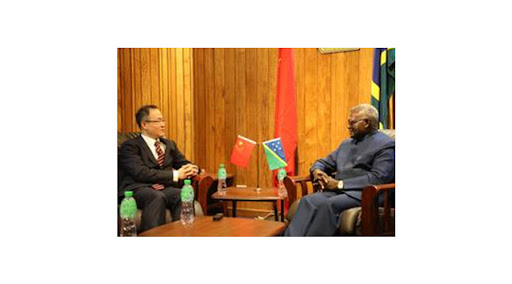A draft security cooperation agreement could allow China to deploy police and miltary personnnel in Solomon Islands to protect its citizens and projects.
The Australian government is expressing anxiety about the leaked (alleged) security agreement.
The draft official document lays down a framework which could permit Beijing to deploy forces to protect the safety of Chinese personnel and major projects in Solomon Islands.
It also states that China's government may make ship visits n Solomon Islands.
The draft was first published online by an advisor to the Malaita Provincial Government Premier Daniel Suidani.
A statement from Australia's Department of Foreign Affairs says the "Pacific family" is able to provide security assistance to Solomon Islands without the need for external support.
It also says it is concerned by any actions that destablise the security of the region.
Serious questions to be asked
Massey University's Centre for Defence and Security senior lecturer Dr Anna Powles has seen the agreement on social media.
She told RNZ Pacific that the document is presented as a draft: "It doesn't have any dates, nor is it signed".
"There are still questions around its authenticity but if it is authentic, it raises some serious questions and if it's not authentic then it also provides some interesting insights into the way in which the geopolitical dynamic is playing out domestically in the Solomon Islands," she said.
Dr Powles said the request to send armed personnel to the Solomon Islands is a concern.
"Now that raises a lot of questions obviously, what is the distinction between police and armed police, and who are the other law enforcement and armed forces that are referred to in the agreement.
"It also talks about what kind of tasks a Chinese contingent would be involved in such as maintaining social order, it's not clear what that means, it also talks about providing assistance on other tasks and it's also unclear what those other tasks would be."
Dr Powles points out that the agreement refers to protecting lives and property, humanitarian assistance and disaster response.
In February, a team of Chinese police officers began working in Solomon Islands. This was two months after the Solomon's Government accepted Beijing's offer to help restore law and order following anti-government demonstrations in November 2021.
Dr Powles believes that if the draft agreement is authentic, then the deployment was a natural extension of the document.
The document also contains some concerning provisions which allow China to send ships to the Solomon's "according to its needs".
"The agreement states that China may, according to its own needs and with the consent of the Solomon Islands government make ship visits to the Solomons and carry out logistical replenishment and stopover and transition in the Solomons."
She said that such provisions would need to be clarified; as it's unclear what "China's own needs" refer to. Are those strategic interests for instance? If so, that would raise a number of concerns. Particularly as to what would happen if China's interests cut across the interests of the Solomon Islands or of its key regional partners such as Australia or Papua New Guinea.
"And it also suggests that logistical support would be provided for ship visits in the Solomon Islands and suggests that perhaps China could seek to establish a logistical supply base in Solomon Islands to support those ship visits.
The document does not specify what types of ships but Dr Powles said "we could safely assume that they are referring to the People's Liberation Army Naval (PLAN) ships."
"In the Pacific, we have seen PLAN ship visits to the region. China has a strong interest in maritime issues and in the Pacific maritime domain. And so that probably is not surprising and there have been long-standing concerns and very public long-standing concerns about the potential for increased ship visits for China increasing its engagement in the Pacific maritime domain and potential implications that may have for a potential base to support those ship visits."
Dr Powles also drew attention to one particular provision of the agreement, which raises alarm bells with respect to the control of information around security cooperation. That provision states that information between the Solomon Islands and China could only be released on mutual agreement by both parties.
"And that suggests that there would be the intent to control public information, to control media briefings, to control what access media has to information about security arrangements between the two countries.
We can be legitimately concerned about lack of transparency about a degree around this agreement," she said.
Solomon Islands switched allegiances from Taiwan to China in
2019.
Copyright @ 2022, Radio New Zealand.
Yours sincerely
Frank Short



